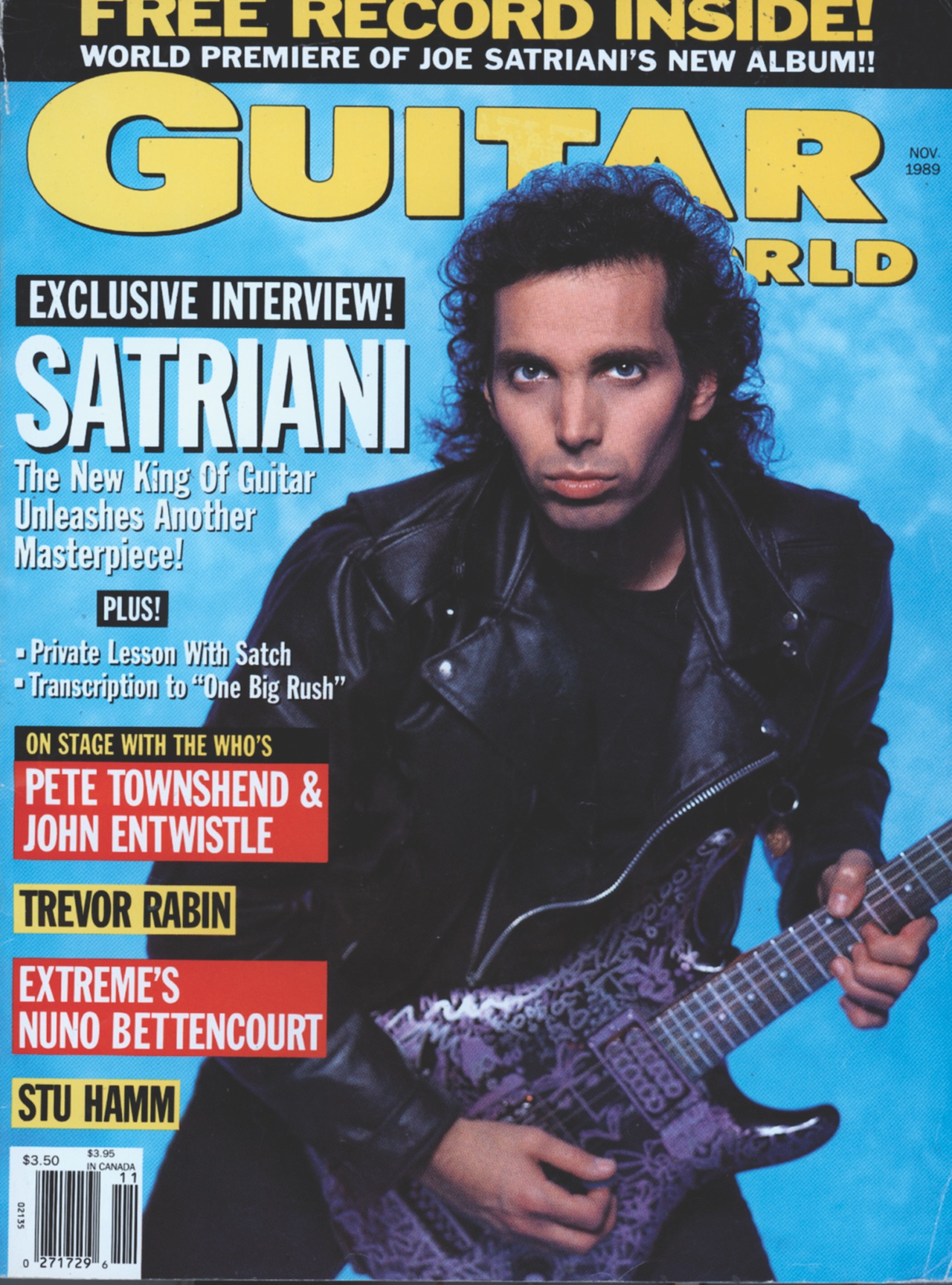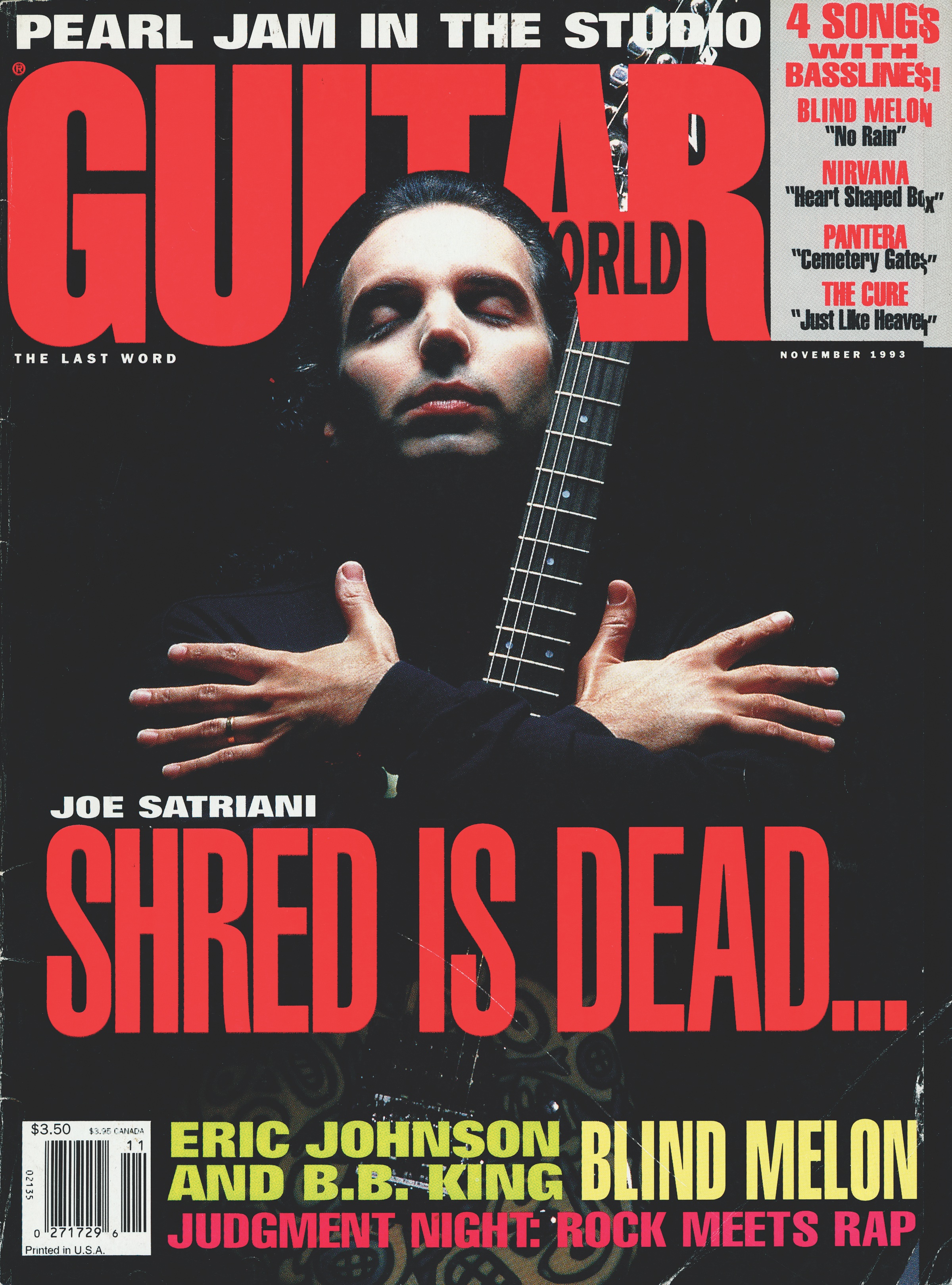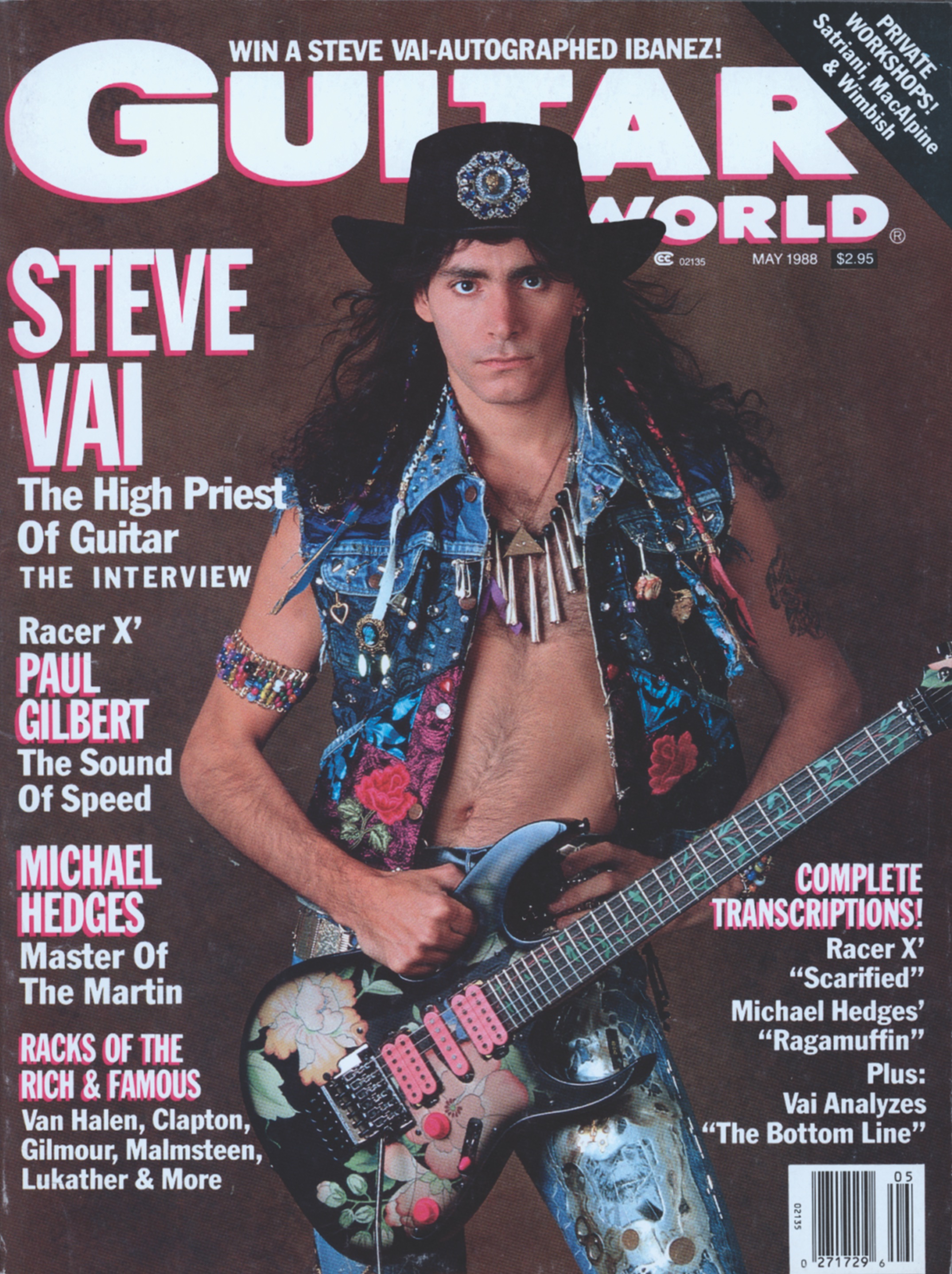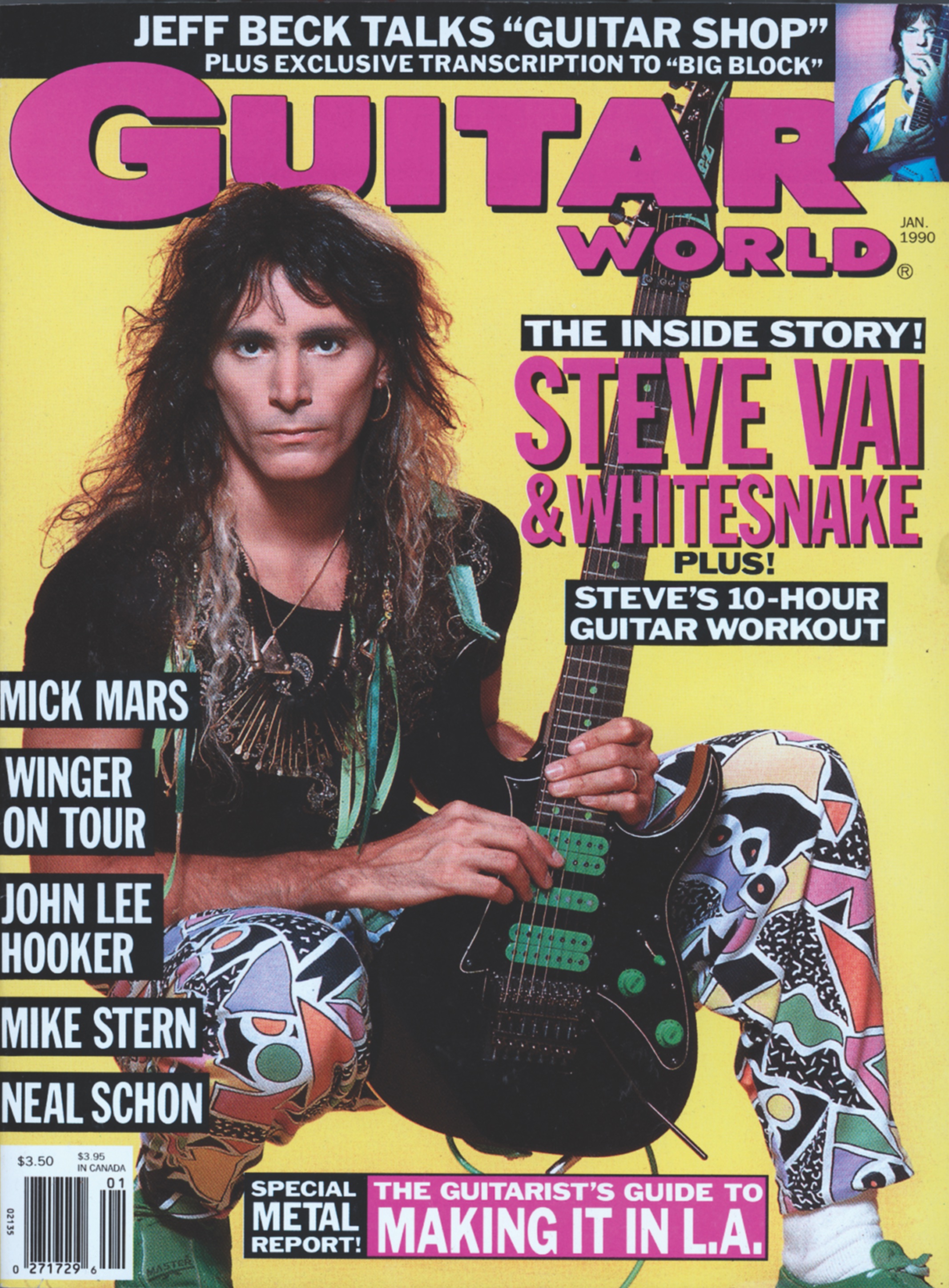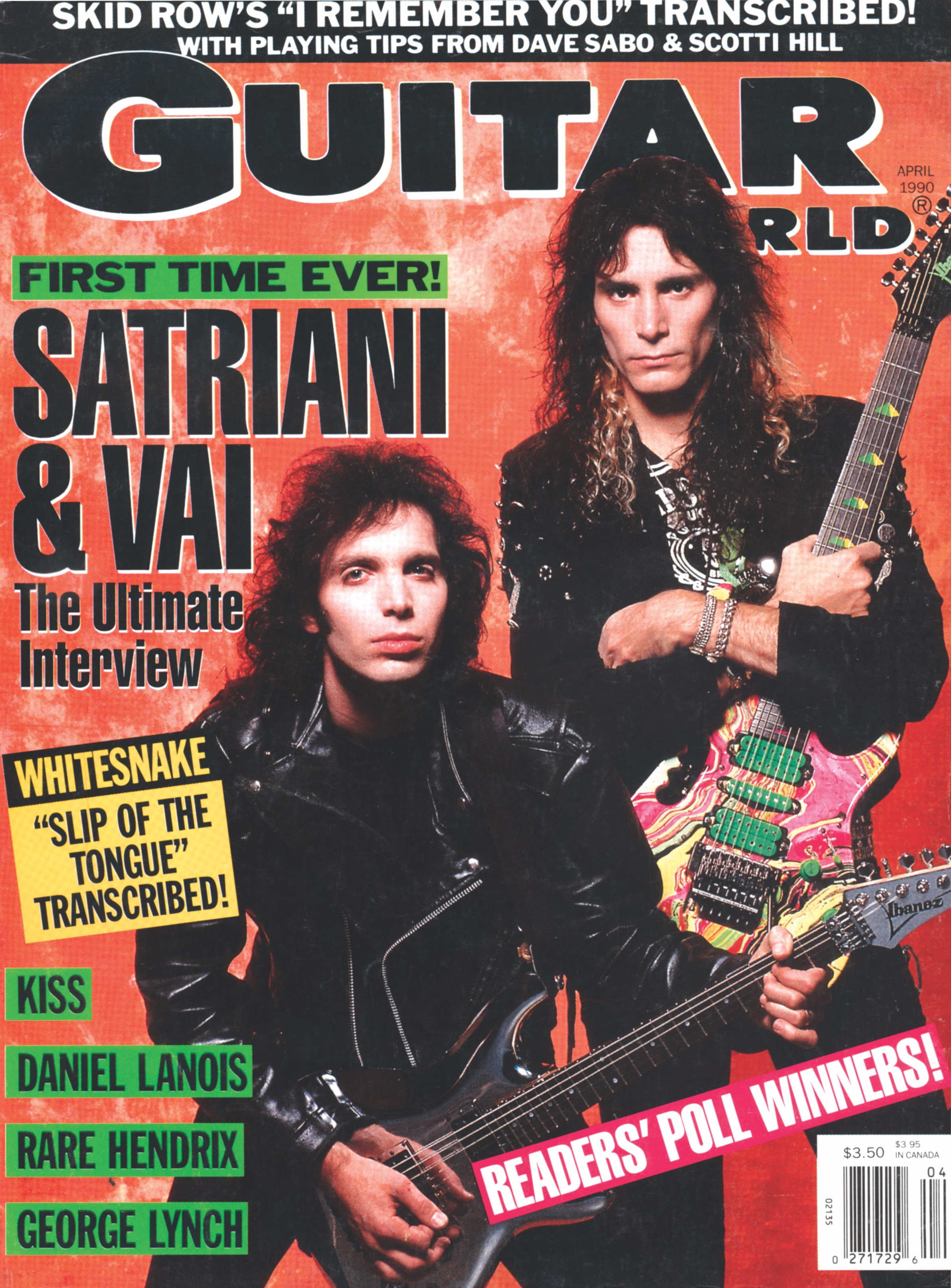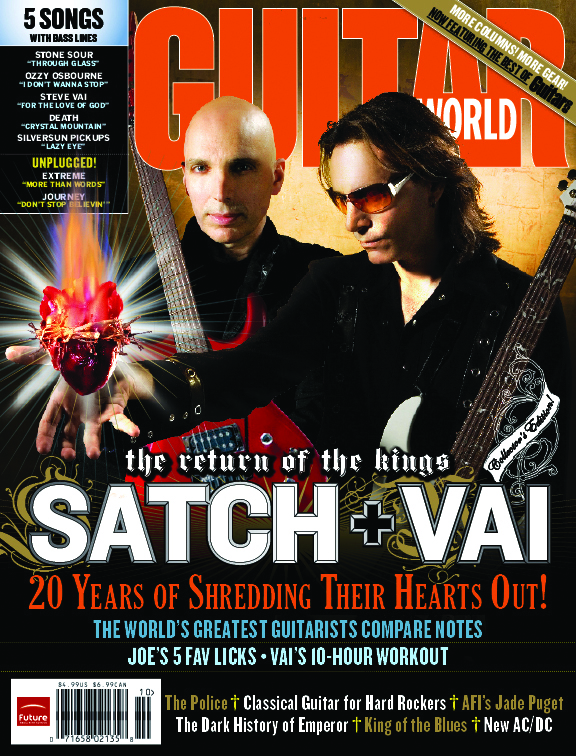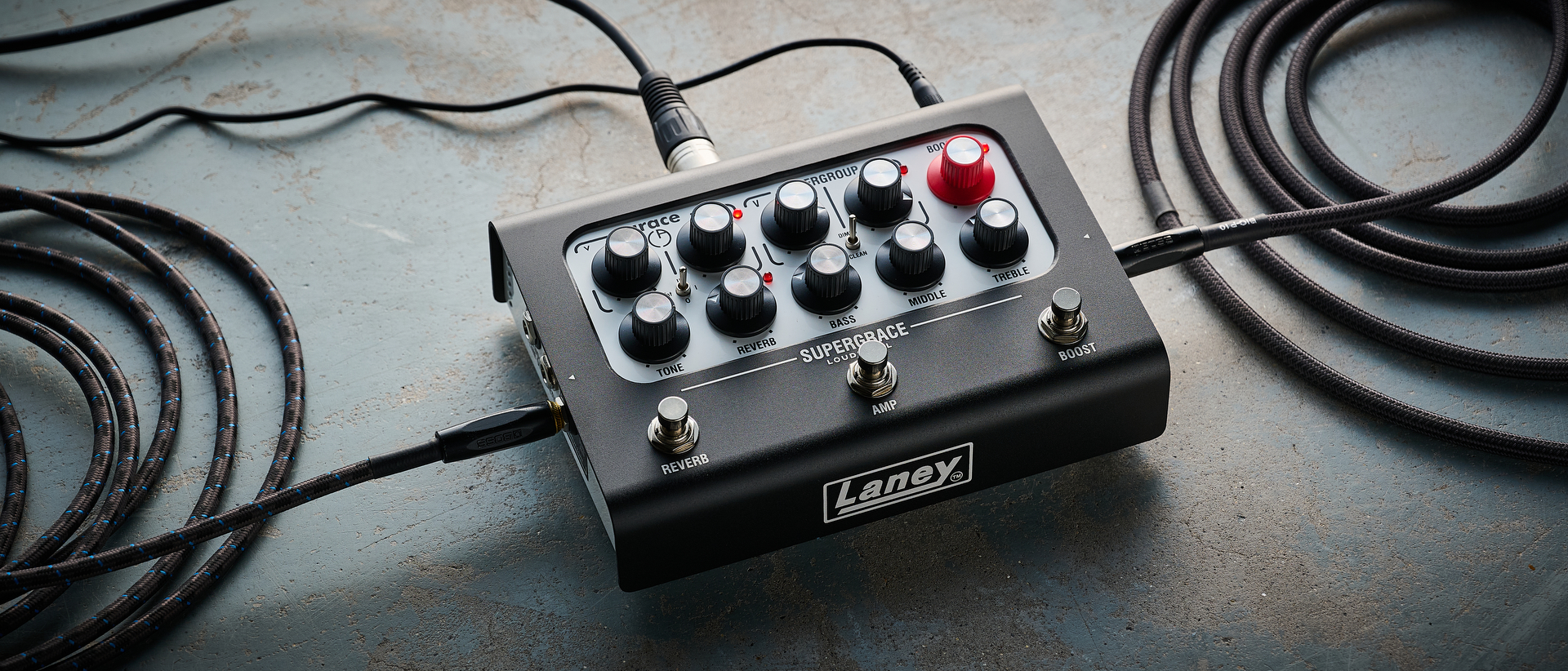“People started saying I looked like Voldemort!” Joe Satriani and Steve Vai look back at their classic Guitar World covers – and the star guitars they loved and lost
The axelords discuss the guitars they’re holding in six key GW magazine covers from the past. Along the way, we learn about guitar thefts, loud photoshoots, hair, pants and flexi-discs...

All the latest guitar news, interviews, lessons, reviews, deals and more, direct to your inbox!
You are now subscribed
Your newsletter sign-up was successful
In honor of Joe Satriani and Steve Vai’s third joint GW cover, we’ve decided to present a special “Satch and Vai” edition of Cover Models. That’s when we track down GW cover stars from the distant or recent past and ask them to tell us about the guitars they’re holding on their covers.
This month, we’d like to send out some big-time thanks to Mike Mesker, Vai’s art director, who contributed several historical details concerning Vai’s guitars.
1. November 1989 – Joe Satriani
What model guitar are you playing in this photo?
Satriani: “That’s my first Ibanez JS prototype, which we called 'Black Dog'. It had a Roadstar neck and a basswood 540 Radius body. By the time of this photo it also had a DiMarzio FRED pickup in the bridge and a PAF Pro in the neck. [Luthier] Gary Brawer had done extensive fret and fretboard work as well.”
Why did you bring this particular guitar to the shoot?
“I started using it live in ’88 and used it all over Flying in a Blue Dream and throughout the ’90s. It was one of my favorites to play at that time because it had a very unique feel and tone. Since it was a distressed, plain black guitar, I thought a little artwork would improve the look and give it a cool vibe. It was featured on the back of the Flying in a Blue Dream album, so it only seemed right to bring it to the photo session.”
Did you use this guitar on any notable recordings?
All the latest guitar news, interviews, lessons, reviews, deals and more, direct to your inbox!
“The first time I recorded with this guitar would have been for The Crush of Love on the Dreaming #11 live/studio EP. The song, recorded and mixed by John Cuniberti, featured Jeff Campitelli on drums, along with my guitar, bass and keyboard work. It was first released on a Guitar Player flexi-disc! I really got to know the guitar during the Flying in a Blue Dream album sessions in ’89, as it was my main guitar for that album.”
What do you love about this guitar?
“This was the first guitar that I had a chance to mold to fit my ideas of melodic expression. I liked the 540 Radius body concept but made a few changes to make it even more comfortable to hold. The compound fretboard radius was essential to what I was trying to achieve. That took months of trial and error to figure out.
“The techs at Ibanez, Steve Blucher at DiMarzio and San Francisco luthier Gary Brawer helped me every step of the way. We played with fret size, potentiometer values, high pass filters, pickups, etc. Eventually, this prototype allowed me to play melodies with extreme detail. It responded to even the smallest touch from my fingers.”
Do you still own this guitar?
After it was stolen in San Francisco during a short tour with Steve Miller, then purchased back from the thieves, it lost some of its mojo
“Yes, I do. However, after it was stolen in San Francisco during a short tour with Steve Miller, then purchased back from the thieves, it lost some of its mojo – and its artwork! The thieves rubbed off all the original art in an effort to disguise it.
“I re-illustrated it a few times since then, and it’s still in my collection, but I don’t play it much these days. I’ve made further improvements to the JS line that reflect a better functioning of the instrument.”
Do you recall anything about this shoot?
“Is this me doing my best 'Magnum' or 'Blue Steel' look? I remember this shoot because of my hair styling, which was more a result of desperation than choice. It was an evening session in Hollywood at Neil Zlozower’s studio, where we shot the inside cover for Flying in a Blue Dream and The Extremist, and countless other photos.
“Neil is a force of nature; he always pulls something new and iconic out of you during his loud, raucous photo sessions. At one point my hair stopped cooperating and I just brushed it off my forehead, gave this funny look to Neil and he snapped the photo. We all laughed and agreed, 'That’s the shot!'”
2. November 1993 - Joe Satriani
What model guitar is in this photo?
Satriani: “My favorite Donnie Hunt-illustrated JS named 'Blue Donnie'. He painted it after I asked him to try using larger characters and fewer colors. Donnie was a wild, inspired artist who painted anything and everything in his environment. He painted a lot of my stage clothes for the first few tours I did as a solo artist.”
Why did you bring this guitar to the shoot?
“Since I knew the cover concept before the shoot, I thought that Donnie’s Day of the Dead-inspired artwork would fit right in. It was perfect! Seeing those skeleton figures on the body really helped sell the photo.”
Did you use this guitar on any notable recordings?
“Oddly enough, I can’t remember what I used it on in the studio. I started every Flying in a Blue Dream tour show with it, and it figured into The Extremist and Time Machine tours.”
What do you love about this guitar?
“The guitar looked and played great. It was one of those rock-solid guitars that never seemed to need an adjustment. It had a very balanced tone as well, not wild or hot, just even and balanced.”
Do you still own this guitar?
“Unfortunately, it is currently stolen. We came back from a short tour in the mid-’90s only to find it had been nicked from our storage locker at the San Rafael, California, facility that Metallica would ultimately take over. I would really like it returned, please!”
Do you recall anything about this shoot?
“This cover was fun to shoot, and maybe a bit creepy, too. I was cool with the idea that I was representing the end of 'shred', even though we all knew it wasn’t true. But I’d never had to pose 'dead' before!
“The alternate fold-out 'Not!' cover was a fun idea, but if you look at who else is featured in the issue you get a good sense of what was happening at that time. Lead guitarists were taking a lot of flak for being, well, lead guitarists! 'Pay no attention to trends and just do what you believe in' – that’s my credo.”
3. May 1988 – Steve Vai
What model guitar are you holding in this photo?
Vai: “A production prototype of the Ibanez Jem77FP. The positioning of the fabric pattern on the body is somewhat unique because Ibanez was still working on the positioning variants for the production guitars. The black area around the pickup selector is indicative of my earliest florals.
“Bonus note for JEM nerds: it originally had a 'wrist rest' installed – like the earliest run of original JEMs – before it was withdrawn due to a patent dispute with Kahler. Pads for the wrist rest are visible either side of the trem.”
Why did you bring this guitar to the shoot?
“Because it was new. And also because this shoot had a dual purpose as marketing collateral for Ibanez and the launch of the floral JEM, which came out after the initial Loch Ness Green, Shocking Pink and Desert Sun Yellow models.”
Did you use this guitar on any notable recordings?
“It appears in the [David Lee Roth] Just Like Paradise video, along with the original Red Heart triple neck. It’s unlikely it was used on a recording. A different prototype floral was used on the Skyscraper tour [with Roth].”
What do you love about this guitar?
“I have always felt that the floral JEMs are the best-sounding JEMs. Something about the fabric bonded to the body somehow gives the guitars a certain resonance.”
Do you still own this guitar?
“No. It’s unclear what happened to it. Probably given away – or stolen.”
Do you recall anything about this shoot?
“It was photographed by John Livzey in Los Angeles and later used by Ibanez as the classic 'High Priest of Guitar' poster. Other photos from the shoot appear in the article.”
4. January 1990 – Steve Vai
What model guitar are you holding in this photo?
Vai: “This is the second Ibanez Universe prototype. I named this guitar 'Bodhi', and its collection number is SV84. Interestingly, this guitar has 'Jem' on the headstock, because this was made before the 'Universe' name was decided on.
“It was taken on the Whitesnake tour as a spare, and at some point my tech, Stan Schiller, covered the guitar in adhesive green dots purchased from Office Depot. The larger dots eventually fell off the body, but smaller dots remain stuck to the pickguard.”
Why did you bring this particular guitar to the shoot?
“Probably because it was a brand-new guitar at the time of the shoot. Most Whitesnake-era cover photos were this guitar, or the white UV eventually given to Prince.”
Did you use this guitar on any notable recordings?
“The first prototype seven-string was used on the Whitesnake record. This black Universe seven-string is the second prototype, and I have used it on virtually every recording I’ve played a seven-string on throughout my catalog. It’s my go-to seven-string.”
What do you love about this guitar?
“This guitar is my favorite-sounding Universe in my collection. It also has the thinnest neck of all my Universe guitars. It’s friendly to play, and just seems to be one of those instruments that came together by the stars.”
Do you still own this guitar?
“Absolutely, and I still use it.”
Do you recall anything about this shoot?
“Shot by Neil Zlozower in Hollywood. I wore these pants quite a bit during the Passion and Warfare sessions. The shoot also included photos of me and this guitar with a Harley-Davidson chopper.”
5. April 1990 – Joe Satriani & Steve Vai
What models are in this photo?
Vai: “I’m using one of the first [Ibanez] Universe UV77MC multicolor swirl prototypes.”
Satriani: “That’s one of two original Ibanez JS chrome guitars. It’s probably around the time I had just received them. Eventually I got a third one. The one in the photo would be number one, the one we call Chrome Boy.
“This was the really early days of the JS model, and so we were still toying with the kind of wood we were using, the pickups, everything was changing really fast. And it was also only the second time, I think, that I was out touring as a solo artist. So I was really coming to grips with how to do an instrumental guitar show and what kind of gear I needed for it.”
Why did you bring these particular guitars to the shoot?
Satriani: “This was really my first attempt to figure out how to chrome a wood-body guitar. And there were issues with it. With one of them, we couldn’t stop the chrome from buckling up off the wood. It was a really big problem, because it was dangerous. You rubbed your skin against it, it would just rip your hand open. But I had this guitar, and Ibanez wanted me to play it so I could give them feedback.”
Vai: “It was new and eye-catching. Many promo images for [Vai’s 1990 album] Passion and Warfare featured this guitar. The guitar has faded considerably since the shoot.”
Did you use these guitars on any notable recordings?
Vai: “It was used here and there on Passion and Warfare, and it appears on the album’s cover with the handle airbrushed out. And the reason the one on the cover doesn’t have the handle was because we were going to offer it as a production model, and the production model didn’t have the handle. So we took it out of the photo. The guitar also appears in Whitesnake’s Fool for Your Loving music video.”
Satriani: “I’ve used Chrome Boy continually. I toured with it for a very long time. It was maybe after [2001’s] Live in San Francisco that I stopped. I think the second chrome guitar, the one I called Pearly Gates, because it had Pearly Gates pickups in it, was stolen right around that time. And so I decided to not bring out the Chrome Boy anymore. It became the home guitar at that point.”
What do you love about this guitars?
Satriani: “It looked really cool, and I was very excited about it.”
Vai: “It was bold and colorful, and launched the Ibanez Universe seven-string into the public’s consciousness.”
Do you still own these guitars?
Satriani: “Yes, absolutely.”
Vai: “No. I gifted it to [pre-teen guitar prodigy] Thomas McRocklin in 1990, as a thank-you for his appearance in the video for The Audience Is Listening.”
What do you recall about this shoot?
Satriani: “It was the Flying in a Blue Dream period for me, and Passion and Warfare for Steve. So it was perfect timing for us.”
Vai: “Shot by Neil Zlozower at his studio in Hollywood.”
Satriani: “When I’m looking at that cover, in my head I can hear Neil yelling at me, 'Satriani, why’d you bring that damn chrome guitar? That thing’s gonna screw up my lens!' [Laughs]”
[Editor's note: You can read the full archive interview with Joe Satriani and Steve Vai on GuitarWorld.com]
5. October 2007 – Joe Satriani & Steve Vai
What models are in this photo?
Vai: “'Shapes', the first Ibanez JEM equipped with True Temperament frets, received in 2007.
Satriani: “That’s the JS1200. I had a red ’66 Fender Electric XII, and I took a picture of it and sent it to Ibanez. I said, 'Can we get something that’s like that, but a little different, a little updated?'”
Why did you bring these particular guitars to the shoot?
Vai: “Like many photo shoots, I brought one of the newest and most interesting guitars that recently arrived at my studio.”
Satriani: “The 1200 would have been kind of new at that time, too. But it’s not unusual for me to bring two or three guitars. I would usually bring a white one, a black one and a red one, because you never know what looks the best.”
Did you use these guitars on any notable recordings?
Vai: “I don’t recall. In some ways it was a proof of concept for further guitars that would receive True Temperament necks, including both EVO and FLO [two of Vai’s Ibanez JEM models] for a time. I took this guitar with me to road-test on the 2007 Sound Theories tour.”
Satriani: “It would have been probably around [2010’s] Black Swans and Wormhole Wizards, that period, when I was using this guitar. And I used it live extensively. But the guitar had 22 frets, and eventually I went up to 24. So 2010 would have been when I stopped using it as a tour guitar because of that. I had too many songs that needed 24 frets. Because if you put 24 frets on a guitar, you’re gonna use ’em.”
Vai: “Guitar players are like that. You give them 10 pedals, they’ll step on all of ’em eventually!”
What do you love about these guitars?
Vai: “Improved tuning all over the neck!”
Satriani: “It had the [DiMarzio] PAF Joe pickup in the neck position, which allowed me to do more melody and solo playing in the neck position when I had a lot of distortion. Because I found that most pickups there got a little boomy. Which was okay for an eight-bar solo or when you played clean.
“But increasingly my gig got stranger and stranger – I just played melody/solo, melody/solo for, like, three hours a night. So we started to think about, well, what pickup would service that better?”
Do you still own these guitars?
Vai: “Yes.”
Satriani: “I do. I think it may be the only 1200 I have.”
Do you recall anything about this shoot?
Satriani: “I remember people started saying I looked like Voldemort. [Laughs]”
Rich is the co-author of the best-selling Nöthin' But a Good Time: The Uncensored History of the '80s Hard Rock Explosion. He is also a recording and performing musician, and a former editor of Guitar World magazine and executive editor of Guitar Aficionado magazine. He has authored several additional books, among them Kurt Cobain: Montage of Heck, the companion to the documentary of the same name.
